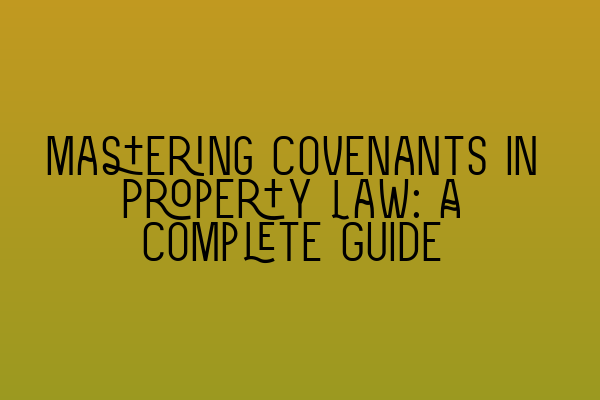Mastering Covenants in Property Law: A Complete Guide
Welcome to SQE Property Law & Land Law! As experts in property law, we understand the importance of mastering the intricacies of covenants. In this comprehensive guide, we will delve into the details of covenants, their types, and how they affect property transactions.
Understanding Covenants
In property law, covenants are legal obligations or promises that bind the owners of land. They are typically included in contracts, deeds, or leases and dictate certain actions or restrictions related to the use, maintenance, or development of the property.
Covenants can have a significant impact on property ownership and the rights and responsibilities of the parties involved. It is crucial to have a clear understanding of covenants to ensure compliance and avoid legal disputes.
Types of Covenants
There are various types of covenants that property owners should be aware of. Here are some common examples:
- Restrictive Covenants: These covenants limit the use or development of the property to maintain a certain standard or protect the interests of neighboring properties. They may restrict the type of buildings, the use of land, or even the presence of certain structures.
- Positive Covenants: Positive covenants require the property owner to take specific actions, such as maintaining shared amenities, contributing to maintenance costs, or adhering to specific architectural guidelines.
- Enforceability: It is essential to understand the enforceability of covenants. Covenants may be binding on subsequent owners if they run with the land, while others may only be enforceable between the original parties to the covenant.
Implications of Covenants
Covenants can have a significant impact on property transactions and the rights of property owners. It is crucial to consider the implications of covenants before entering into any agreements or making changes to your property.
For example, if you are planning to build an extension to your property, you may need to check whether any restrictive covenants are in place that could prohibit such alterations. Violating a covenant could lead to legal consequences, such as injunctions, damages, or even the requirement to reverse any changes made.
Seeking Legal Advice
Due to the complexities and potential legal implications of covenants in property law, it is always advisable to seek professional legal advice. At SQE Property Law & Land Law, our team of experienced solicitors can guide you through the intricate process of understanding and dealing with covenants.
If you are unsure about the implications of covenants on your property, our expert solicitors are here to help. Contact us today to schedule a consultation and receive personalized advice tailored to your specific situation.
For more information about property law and related topics, feel free to explore our other articles:
- Understanding Contractual Capacity: Rights and Limitations
- Interactive SQE Mock Tests for Contract Law: Test Your Knowledge
- Join Our SQE Contract Law Webinars: Expert Insights and Guidance
- Contractual Capacity: Understanding Legal Competence in Contracting Parties
- Contract Law Reforms: An Analysis of Recent Changes
Thank you for choosing SQE Property Law & Land Law for all your property law needs. We look forward to assisting you!
